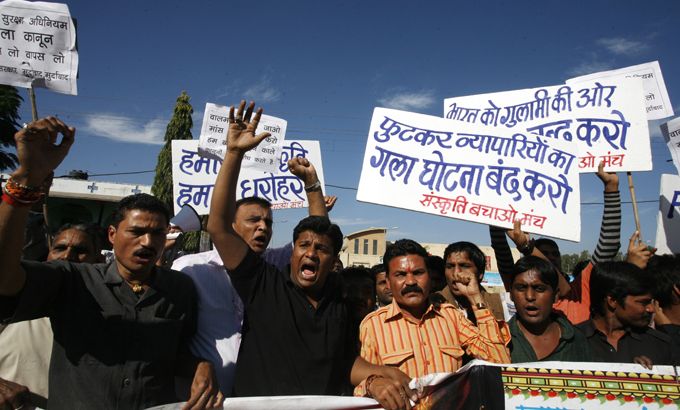India vote paves way for foreign supermarkets
Government wins key vote that clears way for overseas firms to enter country’s lucrative $450bn retail sector.

The lower house of the Indian parliament has voted to allow foreign supermarket chains to operate within the country, marking a victory for the ruling minority government’s economic reform agenda.
The vote on Wednesday was non-binding, but a loss would have made it harder for Prime Minister Manmohan Singh to pursue a policy that would open India’s $450bn retail sector to foreign chains.
The victory gives Singh’s fragile ruling coalition a much-needed boost at a time when he is trying to drive through a second major economic reforms package through a bitterly divided parliament.
The government was only able to win the vote, held after two days of stormy debate, due to abstentions by two powerful regional parties.
It has now cleared the way for voting on bills aimed at allowing foreign direct investment in the ailing pension and insurance industries, two measures seen by financial markets as key towards liberalising an economy that is in the midst of a slowdown.
Expectations the government would win drove India’s stock market to a 19-month high on Wednesday.
Economic reforms package
Under threat of losing India’s investment-grade credit rating, and facing the prospect of fighting a general election during the worst growth slump in a decade, Singh launched the policy amid a flurry of long-delayed reforms in September.
The package aims to open the retail and aviation sectors, and to allow greater investment in insurance and pensions.
The announcement, however, led to the departure of the Trinamool Congress from Singh’s coalition, leaving the government in a minority in parliament.
Walmart, the US retail giant, aims to be one of the first to set up foreign-owned megastores for consumers in India, a prospect that has raised fears among opposition parties that small shopkeepers will be put out of business.
Foreign stores will have to abide by certain conditions, including having to invest a minimum of $100m, open stores in towns with a minimum population of one million, and source at least 30 per cent of their produce from within India.
Upper house vote
Praful Patel, the minister for heavy industries, had told parliament that foreign direct investment “will not destroy local markets”.
“It is a clear economic subject and we should realise that globalisation will need India to open its business to all the players in the world,” he said.
Mulayam Singh Yadav, an ally of the government but an opponent of foreign supermarkets, invoked the memory of independence leader Mahatma Gandhi, who burned foreign cloth as a protest against British products.
Sushma Swaraj, the parliamentary leader of the main opposition Bharatiya Janata Party, appealed to the government to fight for Indians, “not foreigners”.
The upper house is to vote on the matter on Friday.